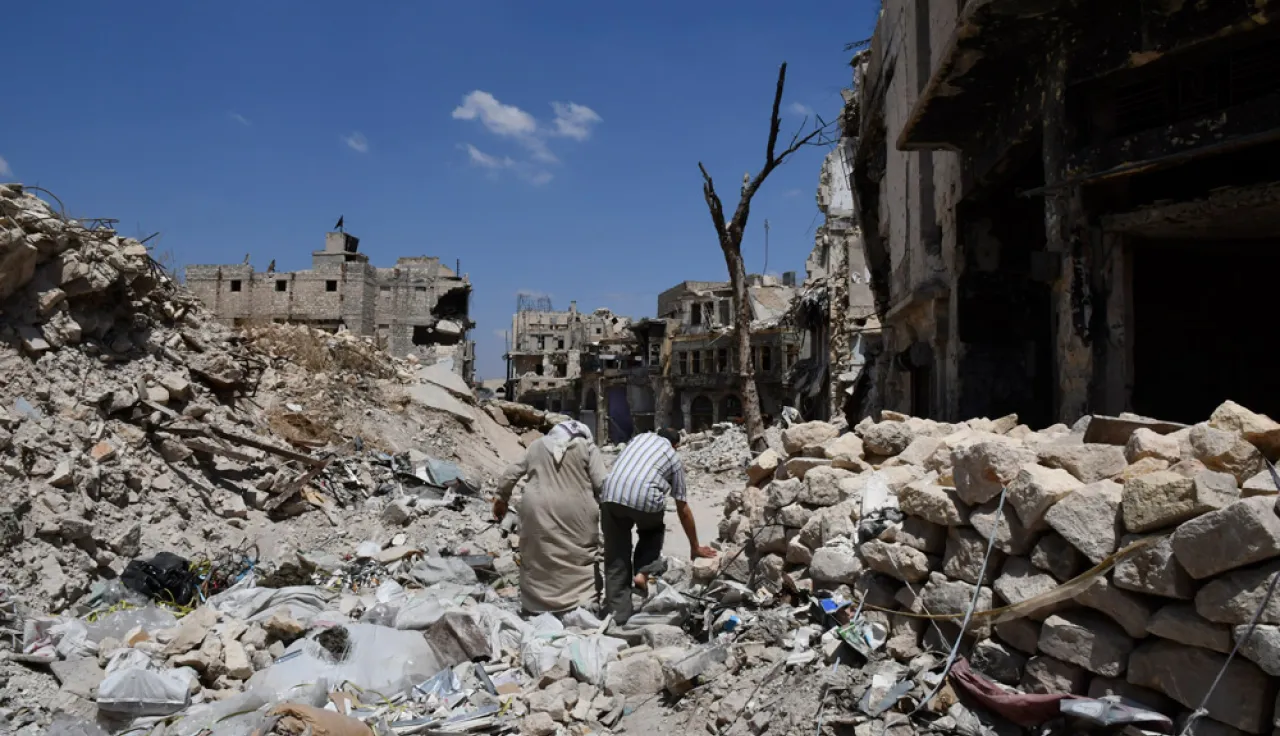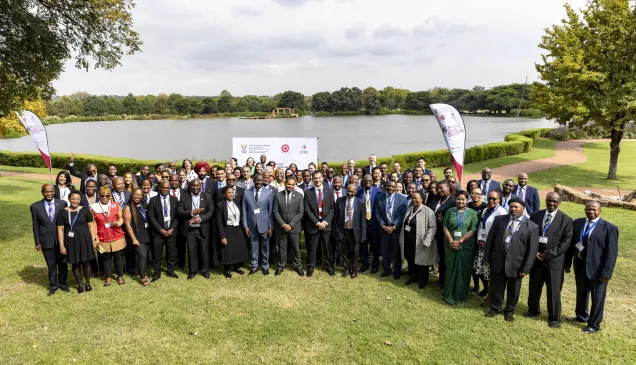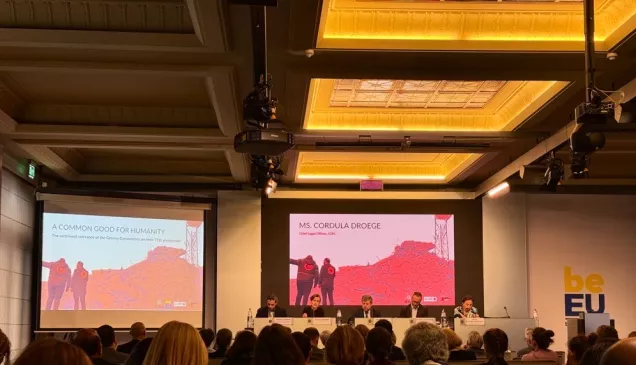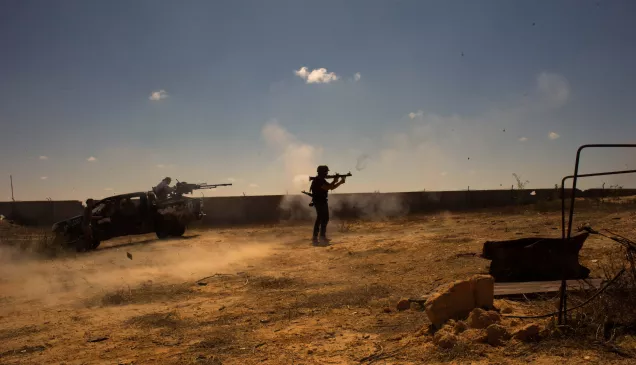Rules in War – A Thing of the Past?

ICRC President Peter Maurer address, Centre for Strategic and International Studies, Washington DC, 10 May 2019. As delivered.
We all see the enormous violations of international humanitarian law in conflicts around the world, and particularly recently in Syria, Iraq, Yemen, Somalia, and many other places. And it is difficult not to ask the question such as the question we are asking today: Is this law still relevant? Has it a future?
While I'm convinced of the enormous value of international humanitarian law, we can never take this relevance for granted. To remain relevant and useful, the law needs debate, discussions, critical review, assessment of its implementation, gap analysis, follow-through with the actors on the ground. So relevance is not a given; relevance is something which comes from deep engagement for the law.
International humanitarian law is a living body of law. Sometimes we forget it. We treat it as a static monument. It's a living body of law. It was developed with militaries for the application in the battlefield to balance military objectives with humanitarian imperatives. The intention was never to have these words stay in dusty legal books, but for the law to provide guidance on the gritty realities of war. Today our collective challenge is to find ways to ensure greater respect for the law within the changing dynamics of conflicts.
So let me just make a first point with regard to what we mean when we speak of international humanitarian law. And I don't want to offend anybody here. Probably everybody knows what international humanitarian law is. Nevertheless, from experience that in many places I go I am confronted with quite different interpretations for what international humanitarian law is, so I wanted first to say a few things on what we think we talk about when we talk about international humanitarian law.
International humanitarian law provides a minimum consensus amongst belligerents to maintain humanity even in the height of hostilities and to contain the negative impact of armed conflict on individuals, societies, and states. The Geneva Conventions and the Additional Protocols are to a large extent customary law reflected in well-established practice throughout time and space. It's not just something which was invented in 1949; it's a century old through time and space elaborated practice.
The Lieber Code, which set out rules of the humane treatment of civilian populations during the American Civil War, may be familiar to many of you and is an important precursor of international humanitarian law enshrined in the Geneva Conventions. The U.S. has substantively contributed to the development of international humanitarian law over the last 200 years, and today the U.S. is a strong supporter for ensuring compliance with international humanitarian law through extremely elaborate guidance to its troops in the battlefield.
In a welcome move just this week, I was pleased to hear that Senators Cory Booker and Todd Young will introduce a bipartisan resolution to acknowledge the 70th anniversary of the Geneva Conventions and call for greater respect for international humanitarian law. I commend this leadership coming from the Senate to bring attention to global humanitarian crises and promote U.S. leadership to reduce suffering of people caught up in conflict.
Built on the realities of conflict, the rules of IHL are not ambiguous. They dictate that military action must be limited by the principles of proportionality, distinction, and precaution. They prohibit the use of indiscriminate weapons, such as biological and chemical weapons that could never be used in accordance of these principles. IHL prohibits torture and other forms of ill-treatment, like rape and sexual violence. It protects those not participating in hostilities as well as provides special protection for health services and health workers. It protects those living under occupation, those in detention, the missing, and it prioritizes restoring family links.
IHL also stresses the importance of neutral, impartial, independent organizations to have access to people in need, the right for these organizations to offer aid, and the obligation of states to facilitate such services.
The ICRC, with more than 150 years of field experience, has been instrumental in shaping legal frameworks and policy recommendations that are rooted both in the reality of the battlefields and the humanitarian needs of populations. The principles of neutrality, independence, and impartiality, along with our practice of engaging with all sides in theaters of conflict and war, are key to our ability to operate. Our practice of confidentiality and our role as a neutral intermediary between warring sides, to build trust and help carve out a space for front-line negotiations, is at the core of what we are doing in so many conflicts around the world.
When I look across the globe at trends influencing conflicts and violence around the world, I observe a couple of factors which today are of particular preoccupation to us:
One, accentuated levels of power competition at global and regional level. I mentioned earlier that at the basis of international humanitarian law is the consensus of belligerents to the normative framework of this law. But with power competition we have increasing difficulties to establish that communality which is at the basis of implementation and respect for international humanitarian law.
Two, the fragmentation of actors and landscapes is a big preoccupation in today's world, not only horizontal fragmentation - the numbers of armed groups and armed actors that we find in specific battlefields - but also vertical fragmentation where the actors on the ground are dependent in the way they conduct hostilities, detain people, and operate or respect, or disrespect, from other actors at national, regional, and global level. So we are not only in a situation of independently operating and fragmented landscape in battlefields, but also in horizontal – vertical fragmentation.
Thirdly, greater complexity in the patterns of violence preoccupy us – whether military, counterterrorism, criminal, or inter-community violence, which are superposing themselves in some of the concrete contexts in which we operate. We see blurring contours in the battlefields because all these origins of violent actions happen at the same time, in the same place, in the same space.
In response, we must navigate between legal systems. We can't anymore focus exclusively on international humanitarian law, because we are not anymore exclusively in a clearly defined space of either internal or international armed conflict. We have to, therefore, also expand on international human rights law, criminal law, national legislation, or counterterrorism legislation amongst others.
Fourthly, wars increasingly involve partners and allies who are outside of the theater of conflict. Our contemporary experience shows how this can lead to the dilution of responsibility, the fragmentation of chains of command, and an unchecked flow of weapons.
Fifthly, battlefields are now occurring in cyberspace. And advancing technology, including robotics and artificial intelligence, means more sophisticated weaponry. Big tech, alongside States, have become important interlocutors of ours to understand those dynamics of an expanding battlefield into the cyberspace and modernization of weapons along artificially intelligent technologies.
And finally, with the absence of political solutions in most of the conflicts in which we operate, in the big theaters of conflicts in which we operate, wars today are protracted, some lasting for years or decades. Our average presence in the 15 largest contexts of ICRC operations is more than 30 years, so we are there for the long haul. Wars have become more urbanized and they are fought in densely populated areas, causing deaths and injury to many civilians, and destroy whole water, health, and electricity systems. We are not confronted anymore just with impact on individuals; we are confronted today in many of the theaters of conflict with systemic impacts on delivery of social systems overall.
The ICRC watches these dynamics to understand the humanitarian impact on the lives of millions of people living under the shadow of conflict and violence. We watch for the violations, but also we see the hundreds and thousands of situations where the law is respected. For example, when a wounded person is allowed through a checkpoint, when a child on the frontlines receives food and other humanitarian aid, when the conditions of detainees are improved or when they can receive contact with their families, we know that international humanitarian law is also respected.
It is clear to us that when IHL is respected harm to civilians is reduced and reconciliation of societies is more likely to succeed in the aftermath. I am always struck when I look at statistics. Again, when I go back to the 15 largest operations in which ICRC is active at the present moment and where we see the most systematic violations of international humanitarian law, these 15 contexts today are at the origin of more than 80 percent of the displacement of populations worldwide. We are not talking about a global disrespect and pattern of disrespect. We have specific places which are of particular concern.
IHL is not an abstract norm, as I have mentioned, but a practical tool in the interest of all to protect lives, and to break the vicious cycle of violence, and to minimize the cost of conflict. I think in the interest of reducing the bill of humanitarian assistance, which we have seen skyrocketing over the last couple of years, international humanitarian law is not only an imperative of ethics and law, it's also good, reasonable – and reasonable policy to engage in in order to reduce the impact of war and violence on people.
Political decisions and military conduct can protect and support civilians and humanitarian norms or they can destroy them. They can help or they can hinder. In this context, I wanted to mention that humanitarian organizations like the ICRC are continuously navigating dilemmas between principles, law, and pragmatism; between being an advocate for a victim and a credible interlocutor for belligerents, which are at the origin of the violations of the law. We navigate constantly those dilemmas, and we are therefore aware of the narratives which challenge the acceptance of humanitarian norms or the law and the restrictions placed on impartial humanitarian action.
More than once, when we engage with belligerents, we are confronted with responses like: 'We know what the law is. You don't have to tell us. But we will respect it only if the only side respect it.'
So we are in transactional mode in many of the situations and not in normative compliance. And this is a big challenge. We see also exceptionalist arguments with belligerents, which are a preoccupation to us. Exceptionalist arguments, which says the adversary is so bad that it has – he has to be fought outside of the limiting framework of the use of force. This is, in many respects, the narratives we are confronted with.
We are increasingly find ourselves at risk of being politicized, faced with security challenges that prevent access, or walls of bureaucracy, which prevent humanitarian actions. These are some of the real challenges we are confronted with, and it has been mentioned beforehand, we are exposed, therefore, increasingly, to security risks because we have difficulties in these situations always to be perceived as the neutral and impartial actor that we want to be.
In this environment, we return to the law, to principles, and to overall mandate to find hopefully pragmatic solutions for populations affected by violence and conflict. We are also refocusing our efforts to prevent violations from occurring. We are intensifying negotiations with belligerents for greater respect of rules. We work bilaterally and work in smaller multilateral cycles and circles by speaking to those involved in partnered operations, reminding them to positively influence their respective allies.
With a sharp increase in nonstate armed groups, we are growing our expertise and pattern of influence on these groups and including peer-to-peer and value-based drivers of influence. We have learned, for instance, that structured armed forces need to be approached in a different way that nonstate armed groups. And we have refined and reshaped and multiplied the different forms of engagement, whether we talk to hierarchical groups and armed forces or whether we talk to nonstate armed groups.
To conclude, dear colleagues, for many decades international humanitarian law and humanitarian action has been the domain of military and humanitarian experts. In recent years, humanitarian issues are increasingly at the core of political agendas. It is vital, therefore, that the humanitarian perspective is systematically brought into the policy debate, and that humanitarian actors are cognizant of the political discussions. And it is a difficult balance to find today that on the one side we want to prevent the politization of the humanitarian space, but on the other hand we need responsible political actors to support neutral and impartial humanitarian assistance.
And this is a big balance that we are navigating. In order to keep international humanitarian law relevant, we cannot just preach implementation and complain about violations or state irrelevance. But it is clear that we need to build and to concretize how security and sovereignty are not incompatible with international humanitarian law and humanitarian action. We need to identify the pressure points which allow us to work within the framework of sovereign states who are at the end of the day giving us a license to operate or not.
It is key that political agendas, like fighting terrorism, can be brought in line with international humanitarian law and principles. And we have to find practical solutions where the inter and conflicting relationship between those two policies which have, each one, its legitimate objectives are intersecting and causing problems to one or the other. We need balances to be found between the protection of civilian and the pursuit of military action, which respects international law, allow hostilities to be waged while protecting civilian lives.
The focus on violations and accountability is important, but the daily implementation of IHL in the field is overlooked very often. And we have also to build on positive examples of respect. But while there is broad support for arms controls and arms treaties and disarmament treaties, arms continue to flow at record levels. We have, therefore, to increase efforts of engagement to respect limitations and more stringent regulations of arms exports legislations.
This year, on the 70th anniversary of the Geneva Conventions, we take stock and we reflect. The Conventions were indeed made for all of us in the name of humanity. They are a handbrake on our worst impulses. The Conventions are still fit for purpose in many respects. Despite a shaky multilateral system, we see positive political signs of support for international humanitarian law. We see it in the strong statements such as the one before the Senate that I have mentioned. We see it on the call by G7 foreign ministers for greater respect and protection of civilians. We see it when we see advocates for IHL, which are sorely needed but do take the stage. And we see the importance of words backed by concrete actions. If we are truly to provide hope for those living in the horrors of the wars of today, we need stronger engagements – we need stronger humanitarian engagement, but also academic and political engagement.



